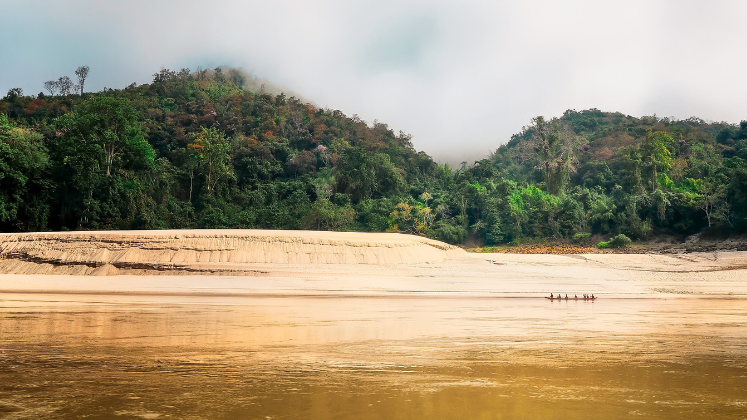The contributors to the 33 chapters of this book show that the field is in desperate need of further study and essential action by social scientists. Awareness of the degradation of our planet and the need for urgent international action should be the top priority of us all, writes Michael Bassey, who earnestly commends Green Planet Blues. Keep it on your bookshelf and dip into it regularly.
 Green Planet Blues: Critical Perspectives on Global Environmental Politics 5th Edition. Ken Conca and Geoffrey D Dabelko. Westview Press. 2014.
Green Planet Blues: Critical Perspectives on Global Environmental Politics 5th Edition. Ken Conca and Geoffrey D Dabelko. Westview Press. 2014.
In 1972 The Limits to Growth report from the Club of Rome and reports of the UN Conference on the Human Environment held in Stockholm alerted many to the future dangers facing Planet Earth. The chapters in Part One of Green Planet Blues explain why documents like these, and especially Garrett Hardin’s The Tragedy of the Commons, caught imagination and conscience.
Yet, today, many concerned about climate change are frustrated. Global policies develop slowly in relation to the scale of problems. Although many political leaders around the world express concern about global warming and environmental degradation, the political will to take effective action is lacking. As Jethro Pettit writes in Chapter 12: “In the North, civil society has concentrated on climate change more exclusively as an environmental issue … and has focused on scientific and technical solutions such as emission controls and carbon credits. In the South, however, climate change has emerged primarily as a sustainable development issue, whose solutions are seen as inseparable from larger issues of poverty, trade and globalization”.
One dramatic chapter, entitled “The Problem of Consumption”, by Peter Dauvergne, shows what the development of plastics has done. “Seasoned sailors avoid the clockwise vortex of calm winds and slow moving currents of the North Pacific Gyre. Inside this dead zone is the Great Pacific Garbage Patch, where jellyfish ingest tiny plastic pellets in a floating graveyard of plastic at least twice the size of the US state of Texas.” He argues that the core of such problems is the inability of governments to tackle fundamentally “the global ecological effects of drivers – such as advertising, economic growth, technology, income inequality, corporations, population growth, and globalization – that together are causing consumption, much of which is wasteful, to rise steadily worldwide.”
So what action should governments take? Chapter 10 focuses on the need for international co-operation. “For some, the challenge of global environmental governance is to fill the ‘anarchic’ space of an ungoverned world system with laws and rules that can change actors’ environmentally destructive behaviour, for others, it is to reform or transform deeply imbedded political-economic practices that already govern the world system: trade, foreign investment, development assistance, multinational corporate activity.” Both ways the challenge of achieving international co-operation is immense. Is this a task for the United Nations?
Chapter 27 describes how in July 2014 the UN Security Council debated the implications of climate change for international security. UN Secretary-General Ban Ki-Moon said, “We must make no mistake. The facts are clear. Climate change is real, and it is accelerating in a dangerous manner… It is a threat to international peace and security.” When the UN Secretary-General says what is well known to environmentalists, but avoided and sometimes denied by others, we might expect the world’s media to highlight the message. (They didn’t). He said, “Around the world, millions of people are in danger of going short of food and water. … Environmental refugees are re-shaping the human geography of the planet, a trend that will only increase as deserts advance, forests are felled and sea-levels rise. Mega-crises may well become the new norm.”
Currently in the UK there is anguished debate about the proposed Transatlantic Trade and Investment Partnership (TTIP) – a trade agreement between the European Union and the United States involving trade liberalization and opportunities for international companies to sue governments if new legislation damages their trade. Chapter 10 carries a serious warning about such liberalisation: “Over the last twenty years, governments throughout Latin America have reduced tariffs and other protectionist measures, eliminated barriers to foreign investment, restored ‘fiscal discipline’ by reducing government spending, and promoted the export sector of the economy.” The authors report on their comprehensive review of these changes: “with some exceptions, free-trade politics have taken a heavy toll on the environment. …U.N. agencies have documented the region’s growing problems with air, soil and water contamination, the result of urbanization and the modernization of agriculture.”
The idea of sustainability is debated in the five chapters of Part Four. It is seen as a controversial but potentially effective response to global environmental problems.
Many of the chapters, in different ways, seek justice for the poor of the world. Joseph Stiglitz, in Chapter 33, writes of the need to “re-imagine” our unbalanced global economy with international policies that benefit the world’s poorest and reduce the damage done by consumer goods on vulnerable ecosystems. “Environmental degradation is everyone’s problem, but it’s especially a problem for the poor, and for obvious reasons. Their position is more precarious, so when things go wrong, whether it’s pollution in a neighbourhood or rising sea levels swallowing a country, they are less able to respond effectively. In this sense, inequality ought to be a fundamental consideration when fashioning environmental policies.”
To me, awareness of the degradation of our planet and the need for urgent international action should be the top priority of us all. As such I earnestly commend Green Planet Blues. Keep it on your bookshelf and dip into it regularly.
The last words should be those of Silas Kpanan’Ayoung Siakor in Chapter 31: “As Europe, the US and the emerging economies of Brazil, Russia, India, China, and South Africa (BRICS) continue to promote development models that rely on economic growth, which is often driven by over-consumption, questions are now being raised about how much longer the human society can continue on this path.”
Michael Bassey is an emeritus professor of Nottingham Trent University and an academician of the Academy of Social Sciences. His methodological text Case Study Research in Educational Settings has sold over 5000 copies. Read more reviews by Michael.







